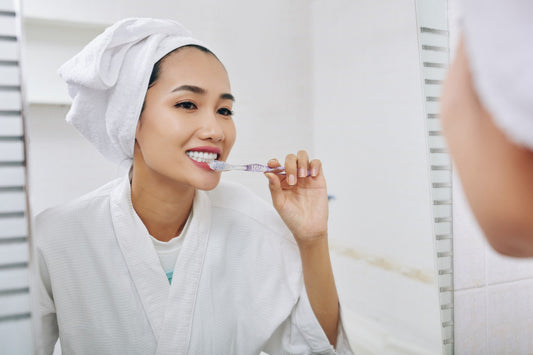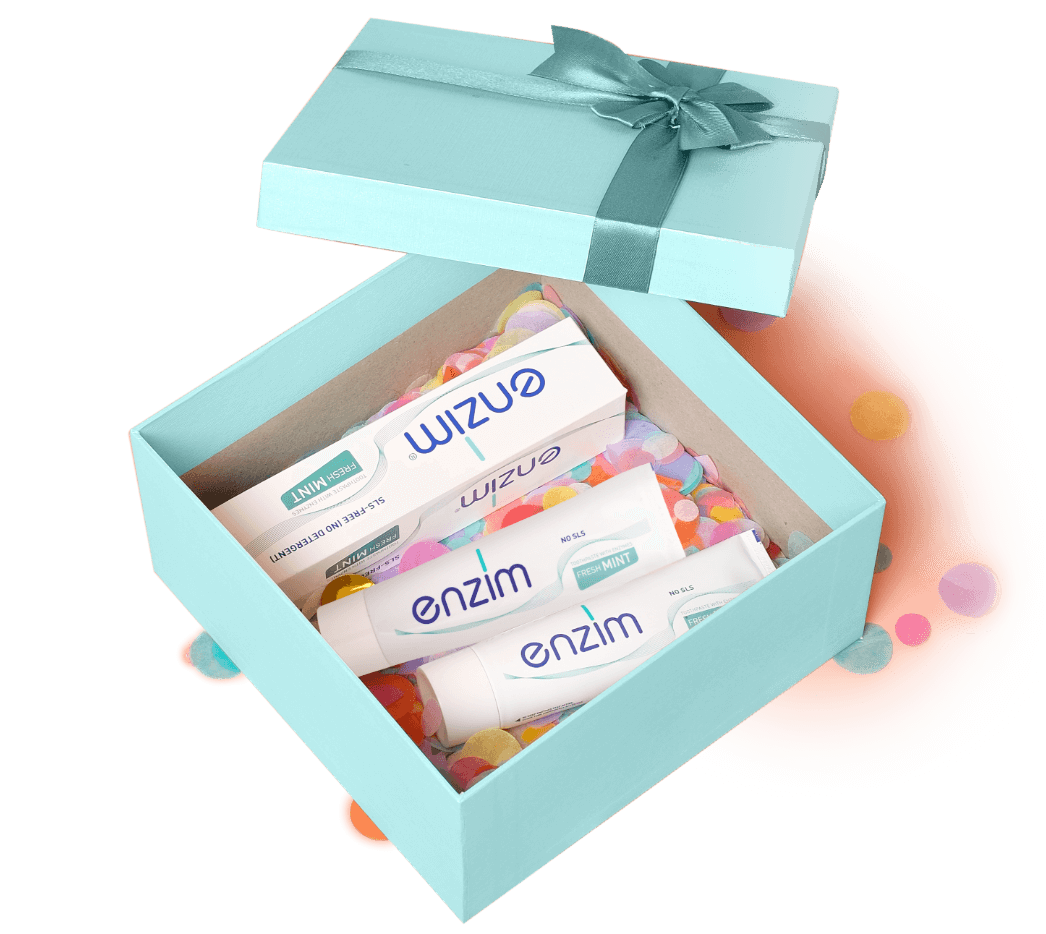What Brushing Feels Like When You Finally Use the Right Toothpaste for Sensitive Teeth

What Brushing Feels Like When You Finally Use the Right Toothpaste for Sensitive Teeth - Enzim Singapore
Tooth sensitivity affects millions of people, often turning something as simple as brushing teeth into a painful experience. The sharp pain from cold water, the dull ache that follows a bite of ice cream, or the burn from overly minty toothpaste they all chip away at your comfort and routine. This discomfort, often manifesting as tooth pain, can significantly impact your daily life. Understanding toothache causes is crucial for finding relief, especially when you experience teeth pain when drinking cold water or when you find yourself thinking, "My tooth hurts when I put pressure on it."
If you've lived with sensitive teeth for a while, you know the drill: tread carefully, avoid extremes, and hope for the best. But what happens when you actually use a toothpaste that works? One that doesn't sting, doesn't burn, and over time, makes brushing feel safe again? That's the kind of transformation we're talking about and it's made possible by choosing the right toothpaste for sensitive teeth.
This article isn't just about ingredients or techniques. It's about the feeling of relief that comes with using the right sensitive teeth treatment. Let's dive into what brushing can and should feel like, and explore how to stop sensitive teeth pain immediately.
Brushing with the Wrong Toothpaste: A Daily Struggle
Many commercial toothpastes are made for the masses. They focus on whitening, extreme freshness, or bold flavors. But if you have sensitive teeth or gums, these formulas often backfire, leaving you wondering, "Why do my teeth hurt?"
Common issues include:
-
A burning sensation from mint or menthol
-
Tingling or pain from strong detergents like sodium lauryl sulfate (SLS)
-
Gritty texture that feels too abrasive on your tooth enamel
-
Immediate discomfort when brushing cold-sensitive areas
When your toothpaste leaves your mouth feeling raw or uncomfortable, it creates anxiety around brushing. And in some cases, people start brushing less often or less thoroughly which only worsens oral hygiene and can lead to issues like cavities or gum disease.
Brushing with the Right Sensitive Teeth Toothpaste: Immediate Differences
Now imagine brushing your teeth and actually feeling better afterward. That's what happens when you use a toothpaste designed for your needs. Here's what you might notice:
-
Smooth, gentle texture: No gritty scrubbing feeling on your enamel
-
No harsh foaming: The absence of SLS creates a more soothing brushing experience
-
No stinging or burning: Just a clean, neutral or mildly refreshing sensation
-
Instant comfort: Especially around areas with exposed dentin or along the gumline
The emotional difference is just as important. You start to feel more confident brushing. No flinching. No skipping sore spots. Just a full, thorough clean without fear of pain or wondering, "Why does my tooth hurt when I put pressure on it?"
What Makes the Right Toothpaste Feel So Different?
The key is the formulation. A high-quality desensitizing toothpaste doesn't just claim to be gentle—it's built from the ground up for comfort and protection.
Look for a toothpaste that:
-
Is free from sodium lauryl sulfate (SLS): SLS is a common foaming agent but can cause irritation, especially in sensitive mouths.
-
Uses natural enzymes: Enzymes like amyloglucosidase and glucose oxidase support your mouth's natural antibacterial system without aggressive chemicals.
-
Has low abrasiveness: This protects the tooth enamel from erosion while still removing plaque buildup.
-
Contains ingredients that soothe, not sting: Like aloe vera, enzymes, or mild flavors instead of menthol overload.
Enzyme-based toothpaste is especially effective. It supports the mouth's natural ability to balance bacteria, fight plaque, and protect sensitive areas without triggering irritation.
The Transition: From Painful to Pleasant
The first time you switch to an enzyme-based toothpaste for sensitive teeth, you might feel the difference right away. But the real magic happens over days and weeks:
-
Day 1-3: Brushing feels noticeably more comfortable. No sting. No flare-ups.
-
Week 1: Sensitive spots begin to feel less tender. You feel more in control.
-
Week 2-3: Your gums look healthier. You're brushing longer and more confidently.
-
After 1 month: You forget what sensitivity felt like. You brush, eat, and drink without worry.
This is the difference that keeps people coming back to enzyme-based formulas. It's not just about relief—it's about reclaiming your daily comfort and finding a sensitive teeth cure that works for you.
Real Stories, Real Relief
Many users who switch to sensitive teeth toothpaste like Enzim report powerful changes:
"I used to dread brushing because my gums would burn for hours. Now, brushing feels normal again." — Sarah, 34
"My dentist recommended I stop using whitening toothpaste. I tried Enzim, and now I can brush without pain." — Johan, 40
"I didn't realize how harsh my old toothpaste was until I switched. No more bleeding gums or that spicy sting." — Aina, 28
These stories echo what many of us know but forget: comfort is possible. The right toothpaste can make brushing feel like care again, not punishment.
Sensitive Gums? This Matters Too
Toothpaste impacts more than just your teeth. People with gum sensitivity benefit just as much, if not more, from switching to a gentle, enzyme-based formula. This is especially important if you're experiencing gum recession, which can lead to exposed dentin and increased sensitivity.
Benefits for sensitive gums include:
-
Less inflammation after brushing
-
No sloughing (peeling) of mouth tissue
-
Aiding natural healing and protection through enzymes
-
Safer for people prone to canker sores or dry mouth
If your toothpaste leaves your mouth feeling dry, tight, or sore, it might be time for a change. This is particularly true if you're experiencing tooth pain when biting or if you've noticed your teeth are sensitive all of a sudden.
So, What Should Brushing Feel Like?
With the right toothpaste for sensitive teeth, brushing should feel:
-
Smooth: The paste glides without roughness.
-
Neutral: Not overly flavored, just fresh.
-
Soothing: No stinging, no burning.
-
Empowering: You brush every area with confidence.
And most importantly, you feel like you're doing something good for your teeth—not just enduring it. This positive experience can encourage better oral hygiene habits overall.
Understanding the Causes of Tooth Sensitivity
To fully appreciate the benefits of using the right toothpaste, it's important to understand what causes sensitive teeth. Common factors include:
-
Worn tooth enamel from aggressive brushing or acidic foods
-
Exposed dentin due to gum recession
-
Tooth grinding (bruxism), which can wear down enamel
-
Recent dental procedures
-
Cracked teeth or worn fillings
-
Temporomandibular disorder (TMJ), which can cause referred pain in teeth
Knowing the root cause of your sensitivity can help you address the issue more effectively. For instance, if tooth grinding is the culprit, you might need to consider using a mouthguard in addition to sensitive teeth toothpaste.
Addressing Dentin Hypersensitivity
Dentin hypersensitivity is a common condition that can cause sharp pain when teeth are exposed to temperature changes or pressure. This occurs when the dentin, the layer beneath the enamel, becomes exposed. Using a soft-bristled toothbrush and toothpaste designed for sensitive teeth can help manage this condition by protecting the exposed dentin.
Treatment Options for Sensitive Teeth
While using the right toothpaste is crucial, there are other treatments that your dentist might recommend:
-
Fluoride treatments: Professional fluoride applications can strengthen tooth enamel and reduce sensitivity.
-
Sealants: These protective coatings can be applied to exposed root surfaces to prevent sensitivity.
-
Dental bonding: For severely sensitive teeth, dental bonding can protect exposed root surfaces.
-
Root canal therapy: In cases of severe sensitivity that doesn't respond to other treatments, a root canal might be necessary.
-
Dental adhesives: These can be used to seal exposed dentin and reduce sensitivity.
-
Gum graft: For severe gum recession, a gum graft can cover exposed roots and reduce sensitivity.
Closing Thoughts
Brushing your teeth is a small act that happens twice a day. But when that small act causes pain, it can impact your whole sense of well-being. If you find yourself asking, "Why does my tooth hurt when I put pressure on it?" or experiencing hot and cold sensitivity, it's time to consider a change in your oral care routine.
The right toothpaste for sensitive teeth changes everything. It transforms brushing from something you avoid to something you embrace. It restores comfort, encourages consistency, and helps you feel like yourself again.
So if you've been brushing through the pain, flinching at the mint, or skipping parts of your mouth it's time. Make the switch. Feel the difference. You deserve a toothpaste that treats your tooth sensitivity with the gentleness it needs and the science it deserves.
Because brushing shouldn't hurt. It should heal. And with the right sensitive teeth remedy, you can enjoy eating and drinking without fear of pain, maintain excellent oral hygiene, and keep your smile healthy and bright. Remember, while teeth whitening might be tempting, it's essential to address sensitivity first to ensure a comfortable and effective oral care routine. Finding the best toothpaste for sensitive teeth and the best teeth whitening for sensitive teeth can make all the difference in your daily comfort and oral health.



